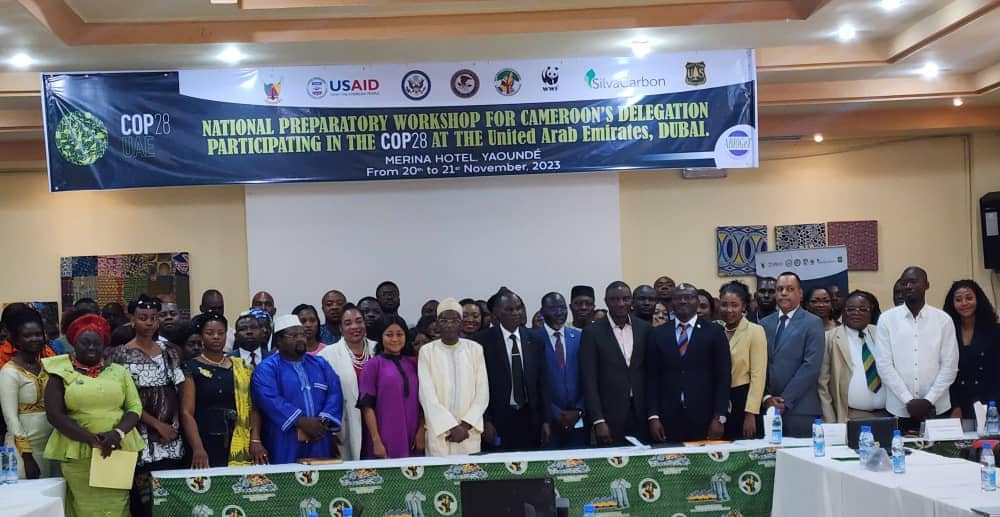Cameroonian Delegation Members to COP28 Armed for Negotiations
By Nformi Sonde Kinsai
The Government of Cameroon represented by the Ministry of Environment, Protection of Nature and Sustainable Development, MINEPDED, has tidied up its official position to be taken to the 28th edition of the United Nations Conference of Parties, COP28 on Climate Change.
Ahead of the conference slated from November 30 to December 12, 2023, in Dubai, United Arab Emirates, MINEPDED organised a national preparatory workshop for members of Cameroon’s delegation in Yaounde on November 20 and 21. The delegation is made up of government officials, representatives of NGOs and Civil Society Organisations.
The event opened by the MINEPDED Boss, Pierre Hele was aimed at presenting the evolution of negotiations at the international level on climate and the level of preparedness of the putting in place of the 2015 Paris Agreement. It also served as an opportunity to evaluate the position and expectations of Cameroon regarding the challenges of COP28 as well as to clarify the roles and responsibilities of each stakeholder that constitutes the delegation.
Addressing participants, the Minister recalled that in the Paris Agreement, parties had agreed to maintain the global average temperature at below 2oC compared to the pre-industrial level as well as to continue with efforts to limit temperature increase at 1.5oC.
He said as part of efforts to seek solutions to the negative effects of climate change, the Agreement reiterates the need to conceive and put in place the least greenhouse gas emissions development strategies which in the long run would constitute the base of Nationally Determined Contributions, NDCs. The NDCs, it is noted, are thus a key instrument in the implementation of the Paris Agreement in line with the UN Framework Convention on Climate Change.
Hele said in that regard, Cameron through its NDC committed to reducing greenhouse gases by 35 percent by 2030, thus 12 percent of it unconditionally and 23 percent on condition of total support by the international community in the form of finances, capacity building and transfer of technology.
The Minister recalled that in addition to COP28, the summit on climate negotiations, instituted after the adoption of the Paris Agreement in 2015 would be in its 7th edition. Going by the Agreement, developed countries must be the main drivers in the reduction of global emissions and provision of financial support to developing countries in the fight against global warming.
He talked of the main challenges of COP28 that including the elaboration of the first global balance sheet on climatic actions, negotiations on the rules, modalities and procedures of the putting in place of articles 6.2, 6.4 and 6.8 of the Agreement, ways of just and equitable transition; and operationalisation of funds on losses and damages.
Hele said stakeholders being the bedrock of putting in place climatic actions, it was important to edify them on the orientation of future climatic policy of Cameroon, the Sub-region and the world. He said this could be done, amongst others, through the orientation of their activities in matters of carbon-based development and the reduction of climatic vulnerabilities in sustainable agriculture, renewable energy, climate finance, treatment of materials, and so on. “You constitute an important chain in the putting in place of the NDCs and the search for climate solutions and consequently, the putting in place of the Paris Agreement,” the Minister told the participants.
Meanwhile, in a document circulated during the workshop highlighting the strategic need to respect commitments as well as the advantages of the Congo Basin Forest ecosystem, Cameroon spells out its position.
On the justification of its position, the document notes that despite its huge forest potential, Cameroon continues to face several challenges that limit its capacity to furnish substantial and sustainable ecosystem services such as its contribution to socio-economic development. It notes that all development partners consider the forest a strong instrument in the regulation of the global climate and therefore indispensable for the Stabilisation of global temperature at below 1.5oC; meanwhile, its exploitation decisively contributes to the state budget.
Referring to the development challenges of the country as contained in the National Development Strategy, NDS30 and considering international conventions, Cameroon’s position harps on the Bali action plan that calls for attenuation, adaptation, transfer of technology, capacity building and financing.

